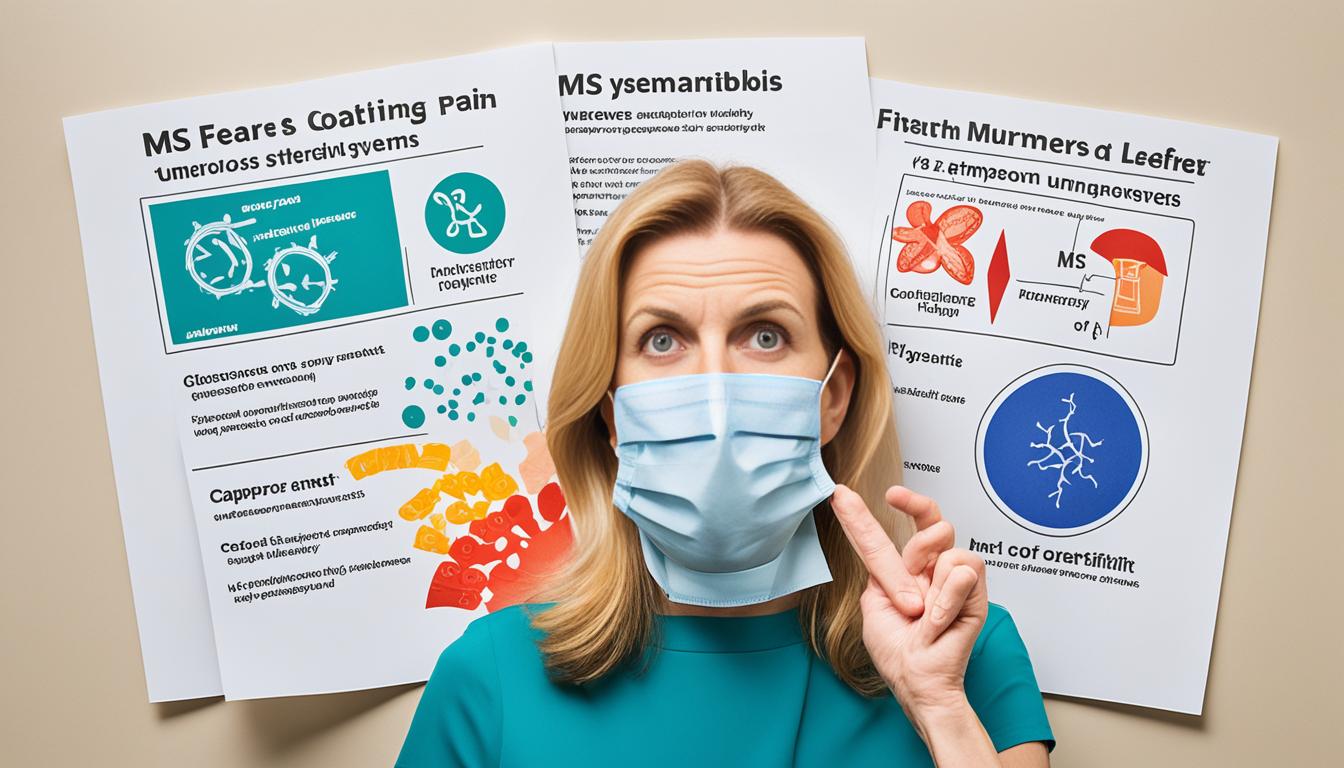Multiple Sclerosis (MS) affects the central nervous system, mainly the brain, optic nerve, and spinal cord. The immune system mistakenly attacks the myelin sheath, the nerve cells’ protective covering. This disrupts signal transmission, causing issues like muscle weakness, vision changes, and memory problems.
The exact cause of MS is not certain, but some things can increase the risk. Low vitamin D, smoking, and some viral infections are tied to more risk. Diagnosing MS isn’t easy because there’s no one test. Doctors check for known symptoms, do physical exams, and use MRI scans and spinal fluid tests to confirm it.
Though there’s no MS cure yet, there are treatments to help. Medicines manage symptoms, while corticosteroids lessen attack severity. Stem cell therapy is also being looked at as a promising option. Living with MS is tough, but support from a team of doctors and changing your lifestyle can help. This way, people with MS can still have rich, active lives.
Key Takeaways:
- MS impacts the central nervous system, causing various symptoms.
- The cause of MS is still not totally clear, but some risks are known.
- Diagnosing MS includes finding common symptoms and using tests to confirm.
- There are treatments like medicines, corticosteroids, and possibly stem cell therapy.
- Support and lifestyle changes can help people with MS live fulfilling lives.
Symptoms of MS and Diagnosis
Multiple Sclerosis (MS) shows up with many different symptoms. These can change from person to person. Some common signs of MS include:
- Loss of vision: It can lead to a sudden loss of vision in one eye for a short while.
- Loss of power: You might feel weak or lose power in an arm or leg due to nerve problems.
- Numbness: Feeling like your legs are asleep or tingling is typical.
- Spasms: Muscle spasms are painful and can interrupt daily life.
- Fatigue: Being incredibly tired is often seen in people with MS.
- Depression: It might cause you to feel low or sad.
- Incontinence issues: Problems controlling your bladder or bowels are possible.
- Sexual dysfunction: It may affect your ability to be intimate.
- Walking difficulties: It can make walking, balancing, and moving hard.
These signs usually appear in episodes. They can happen over 24 to 48 hours, last days to weeks, then get better. Doctors diagnose MS by checking for these key symptoms. They might look for loss of vision, muscle weakness, or numbness during a physical test. To confirm their findings, they use special tests like:
- MRI: MRI scans can show specific damage related to MS in the brain or spine.
- Spinal fluid analysis: Testing the fluid around your spine can also point towards MS.
In addition to these tests, doctors must also rule out other conditions with similar symptoms. Blood tests can help with this. An optical coherence tomography (OCT) test checks the health of the optic nerves, which are often impacted by MS.
Seeking Medical Evaluation
If any of these symptoms sound familiar, it’s crucial to see a doctor soon. Getting a full check-up by a healthcare expert can tell if it’s MS or something else. Finding out early and starting treatment can make handling MS easier and improve your life.
Management and Living with MS
There’s no cure for MS, but many treatments can help. These include special medications to prevent attacks and new lesions. Corticosteroids are sometimes used during relapses to cut down symptoms. If steroids don’t work, a process called plasma exchange might be used instead.
Dealing with MS needs a big team of healthcare experts. You’ll work with neurologists, physiatrists, physical and occupational therapists, and mental health pros. This team helps you watch your health, handle symptoms, and choose the best treatment plan. Moving your body by exercising is very good for people with MS. It can make you feel better and happy.
Keeping your mind healthy is also a must when you have MS. Talking to friends and family, doing things you love, and getting extra help from groups or talking with a counselor really helps. Remember, living with MS might mean changing how you do some things, like using walking aids. Your medical team can help you come up with a plan that fits your needs.
FAQ
Q: What is multiple sclerosis (MS)?
A: Multiple sclerosis (MS) is a condition affecting the central nervous system. It targets the brain, optic nerve, and spinal cord. The immune system wrongly attacks the myelin sheath. This is the protective layer around nerve cells.
Q: What are the symptoms of MS?
A: MS symptoms vary widely. They can include vision loss, muscle weakness, and numbness. Other signs are spasms, fatigue, depression, and incontinence. Sexual dysfunction and walking problems are common too.
Q: How is MS diagnosed?
A: To diagnose MS, doctors look for typical symptoms. They also do a physical exam. Diagnostic tests like an MRI and spinal fluid analysis are crucial. They search for specific markers and lesions linked to MS.
Q: Are there any treatments for MS?
A: There’s no MS cure yet. But, treatments help manage the condition. Medications deal with the symptoms. Corticosteroids lessen attack severity. Stem cell therapy is a new, promising approach.
Q: How can someone manage and live with MS?
A: Managing MS is tough but doable. A strong medical team’s support is vital. It lets people lead active lives. This support includes therapy, mental health care, joining support groups, and lifestyle changes.

